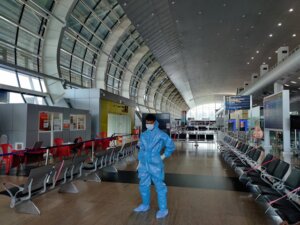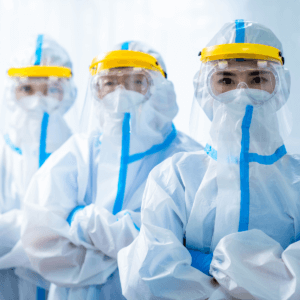How Forensic Cleaners Handle Unattended Deaths
How Forensic Cleaners Handle Unattended Deaths
Key Takeaways
- Forensic cleaners specialize in managing the aftermath of unattended deaths, ensuring the area is safely cleaned, deodorized, and disinfected to remove biological hazards and restore the site.
- The process involves a comprehensive assessment, removal of biological matter, thorough cleaning and sanitizing, odour elimination, and property restoration, utilizing specialized techniques and professional-grade equipment.
- Operating with compassion and discretion is essential, as forensic cleaners recognize the emotional distress families and property owners face and conduct their work respectfully.
- Adherence to legal and environmental regulations is crucial for the safe handling and disposal of biohazardous materials, ensuring public health and safety.
- Professional training and certification are mandatory for forensic cleaners, equipping them with the necessary knowledge and skills to handle biohazardous situations effectively and comply with health and safety standards.
Summary
Forensic cleaners play a critical role in safely managing unattended death sites by removing biological hazards, cleaning, and restoring affected areas. Their work requires specialized training, adherence to health and safety regulations, and a compassionate approach. Professional forensic cleaning ensures thorough decontamination, odour elimination, and legal compliance, providing essential support to affected families and property owners while safeguarding public health.
In the aftermath of an unattended death, a scenario where a person has died alone and remained undiscovered for a period of time, the role of forensic cleaners becomes paramount. These professionals are tasked with the sensitive and crucial job of cleaning and restoring the site. This article delves into the meticulous process forensic cleaners undertake to manage such challenging situations, ensuring safety, dignity, and respect throughout their operations.
Understanding Unattended Deaths
Unattended deaths occur when someone dies alone, and their body is not discovered immediately. These incidents can happen due to various reasons, including natural causes, accidents, or even undetected crimes. The decomposition process starts quickly, and if not handled correctly, it can pose significant health risks and emotional distress for those involved.
The Role of Forensic Cleaners
Forensic cleaners, also known as biohazard remediation technicians, specialize in cleaning sites affected by biological contaminants. Their expertise is critical in unattended death scenarios, where they ensure the area is safely and thoroughly cleaned, deodorized, and disinfected.
Initial Assessment and Safety Measures
The process begins with a comprehensive assessment of the scene once the body has been removed. Forensic cleaners don personal protective equipment (PPE) to safeguard against biological hazards. They evaluate the extent of decomposition, the presence of bodily fluids, and potential structural damage to the property.
Cleaning and Decontamination Process
The cleaning phase involves several steps:
- Removal of Biological Matter: All biological materials, including fluids and tissues, are carefully removed from the site.
- Cleaning and Sanitizing: The area is then cleaned using professional-grade disinfectants to eliminate bacteria and viruses.
- Odour Elimination: Specialized techniques and equipment, such as ozone generators or hydroxyl machines, are used to remove lingering odours.
- Restoration: The goal is to return the site to its pre-incident condition, which may involve repairing or replacing affected structural elements.
Compassion and Discretion
Forensic cleaners operate with a deep sense of compassion and discretion. Recognizing the emotional impact of unattended deaths on families and property owners, they conduct their work with the utmost respect and sensitivity.
Legal and Environmental Considerations
Adhering to legal and environmental regulations is a critical aspect of forensic cleaning. Cleaners must comply with local and national laws regarding the handling and disposal of biohazardous materials, ensuring public health and safety.
Training and Certification
Forensic cleaners undergo rigorous training and certification to handle biohazardous situations effectively. This education covers biohazard cleanup, personal protective equipment (PPE) usage, and compliance with health and safety regulations.
The Importance of Professional Forensic Cleaning Services
Attempting to clean an unattended death scene without professional help is not only dangerous but could also lead to incomplete remediation, posing long-term health risks. Professional forensic cleaners have the knowledge, tools, and experience to ensure thorough cleaning and decontamination, making them an indispensable resource in these situations.
Choosing the Right Forensic Cleaning Service
Selecting a reputable forensic cleaning company is crucial. Look for providers with:
- Certification and Training: Ensure the company’s technicians are properly trained and certified in biohazard cleanup.
- Experience: Choose a service with extensive experience in handling unattended deaths.
- Compliance: Verify that the company follows all legal and environmental regulations.
- Compassion: A good forensic cleaning service operates with empathy and respect towards those affected by the incident.
Forensic cleaners play a vital role in addressing the aftermath of unattended deaths, combining technical proficiency with compassion and respect. Their work not only ensures the safe and thorough cleaning of affected areas but also helps alleviate the burden on families and property owners during such difficult times. By following stringent protocols and adhering to legal and ethical standards, forensic cleaners provide an essential service that contributes to public health and safety.
FAQs
1. What do forensic cleaners do?
Forensic cleaners specialize in cleaning and decontaminating areas affected by deaths, crimes, and biohazardous situations. They safely remove biological hazards, disinfect, and restore the area to its original state, ensuring public health and safety.
Are forensic cleaners the same as crime scene cleaners?
Yes, forensic cleaners are often referred to as crime scene cleaners. They handle not only crime scenes but also unattended deaths, accidents, and any situation requiring biohazard cleanup and decontamination.
How are forensic cleaning services regulated?
Forensic cleaning services are regulated by local and national health and safety laws. Cleaners must follow strict guidelines for biohazard handling, disposal, and decontamination, and often undergo specialized training and certification to ensure compliance and protect public health.
Why Choose AllAces?
AllAces Cleaning & Restoration has over 35 years of industry experience handling extensive forensic cleaning projects across Brisbane, Sydney, Melbourne, and surrounds. Our IICRC-certified technicians are highly trained and experienced utilising the latest technology and equipment to ensure the return of a safe and habitable environment.



